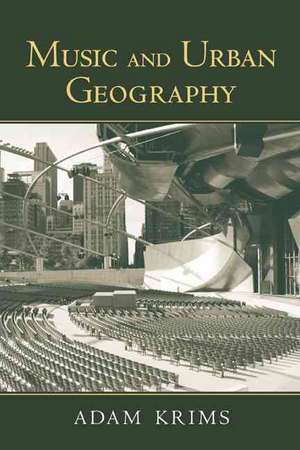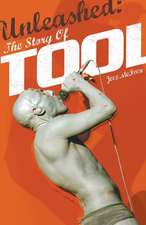Music and Urban Geography
Autor Adam Krimsen Limba Engleză Paperback – 5 feb 2007
Pushing urban geography into new cultural contexts Music and Urban Geography will offer those concerned with the social effects of space newtheoretical models. Ranging from Anonymous 4 to Alanis Morissette, from Curacao to Seattle, this text presents a truly wide-ranging, interdisciplinary, and theoretically ambitious view of both musical and urban change.
| Toate formatele și edițiile | Preț | Express |
|---|---|---|
| Paperback (1) | 431.35 lei 6-8 săpt. | |
| Taylor & Francis – 5 feb 2007 | 431.35 lei 6-8 săpt. | |
| Hardback (1) | 1000.45 lei 6-8 săpt. | |
| Taylor & Francis – 5 feb 2007 | 1000.45 lei 6-8 săpt. |
Preț: 431.35 lei
Nou
Puncte Express: 647
Preț estimativ în valută:
82.55€ • 85.86$ • 68.15£
82.55€ • 85.86$ • 68.15£
Carte tipărită la comandă
Livrare economică 14-28 aprilie
Preluare comenzi: 021 569.72.76
Specificații
ISBN-13: 9780415970129
ISBN-10: 0415970121
Pagini: 246
Ilustrații: 1 b/w image, 2 tables and 2 line drawings
Dimensiuni: 152 x 229 x 13 mm
Greutate: 0.34 kg
Ediția:1
Editura: Taylor & Francis
Colecția Routledge
Locul publicării:Oxford, United Kingdom
ISBN-10: 0415970121
Pagini: 246
Ilustrații: 1 b/w image, 2 tables and 2 line drawings
Dimensiuni: 152 x 229 x 13 mm
Greutate: 0.34 kg
Ediția:1
Editura: Taylor & Francis
Colecția Routledge
Locul publicării:Oxford, United Kingdom
Cuprins
1. Defining the Urban Ethos 2. Space, Place, and Popular Music in Curaçao and Elsewhere 3. Mourning the Impossible Libidinal City in Boogie Nights 4. Marxist Music Analysis after Adorno 5. Music for the Design-Intensive City 6. Music for the Design-Intensive City Notes Bibliography Index
Notă biografică
Adam Krims is Associate Professor of Music and Director of the Institute for Popular Music at the University of Nottingham, UK. His previous book, Rap Music and the Poetics of Identity (2000), was a CHOICE Outstanding Academic Book of the Year.
Descriere
This book theorizes musical aspects of changes that have overtaken major cities in the developed world over past decades. Drawing on musicology, music theory, urban geography and historical materialism, Krims maps changes in how music represents cities and also in how music sounds and is deployed socially in new urban contexts.









